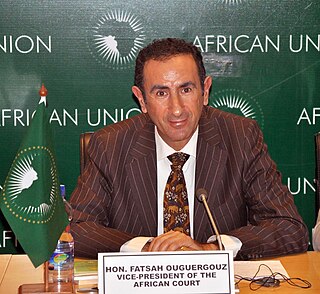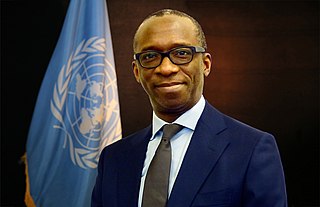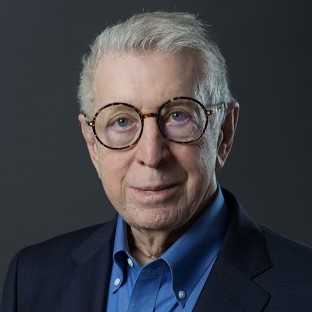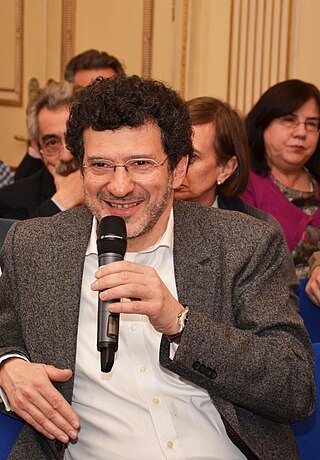Related Research Articles

The International Criminal Tribunal for the former Yugoslavia (ICTY) was a body of the United Nations that was established to prosecute the war crimes that had been committed during the Yugoslav Wars and to try their perpetrators. The tribunal was an ad hoc court located in The Hague, Netherlands.

James Leonard Bacchus is an American lawyer, businessman, and politician who served as a member of the U.S. House of Representatives from Florida from 1991 to 1995. He was a founding member and twice chairman of the Appellate Body of the World Trade Organization in Geneva, Switzerland from 1995 to 2003. He later became a fellow of the European Institute for International Law and International Relations.

Mahmoud Cherif Bassiouni was an emeritus professor of law at DePaul University, where he taught from 1964 to 2012. He served in numerous United Nations positions and served as the consultant to the US Department of State and Justice on many projects. He was a founding member of the International Human Rights Law Institute at DePaul University which was established in 1990. He served as president from 1990 to 1997 and then as president emeritus. Bassiouni is often referred to by the media as “the Godfather of International Criminal Law” and a “war crimes expert.” As such, he served on the Steering Committee for The Crimes Against Humanity Initiative, which was launched to study the need for a comprehensive convention on the prevention and punishment of crimes against humanity, and draft a proposed treaty. He spearheaded the drafting of the proposed convention, which as of 2014 is being debated at the International Law Commission.

Theodor Meron, is an Israeli-American judge. He served as a judge of the International Criminal Tribunal for the former Yugoslavia (ICTY), International Criminal Tribunal for Rwanda (ICTR), and the International Residual Mechanism for Criminal Tribunals (Mechanism). He served as President of the ICTY four times and inaugural President of the Mechanism for three terms (2012–19).

Nabil Elaraby is an Egyptian politician and diplomat who was Secretary General of the Arab League from 1 July 2011 to 3 July 2016. Previously, he was Foreign Affairs Minister of Egypt in Essam Sharaf's government from March to June 2011.

International criminal law (ICL) is a body of public international law designed to prohibit certain categories of conduct commonly viewed as serious atrocities and to make perpetrators of such conduct criminally accountable for their perpetration. The core crimes under international law are genocide, war crimes, crimes against humanity, and the crime of aggression.
The Appellate Body of the World Trade Organization (WTOAB) is a standing body of seven persons that hears appeals from reports issued by panels in disputes brought on by WTO members. The WTOAB can uphold, modify or reverse the legal findings and conclusions of a panel, and Appellate Body Reports, once adopted by the Dispute Settlement Body (DSB), must be accepted by the parties to the dispute. The WTOAB has its seat in Geneva, Switzerland. It has been termed by at least one journalist as "effectively the supreme court of world trade".

Command responsibility is the legal doctrine of hierarchical accountability for war crimes. The legal doctrine of command responsibility stipulates that a superior officer can be held legally responsible for war crimes committed by subordinates.

Fatsah Ouguergouz is an Algerian judge born in France.

The Graduate Institute of International and Development Studies, or the Geneva Graduate Institute, abbreviated IHEID, is a government-accredited postgraduate institution of higher education located in Geneva, Switzerland. The current Geneva Graduate Institute was formed by a merger between the Graduate Institute of International Studies and the Graduate Institute of Development Studies in 2008.
James Richard Crawford, AC, SC, FBA was an Australian academic and practitioner in the field of public international law. He was elected as Judge of the International Court of Justice for a full term of 9 years in November 2014 and took his seat on the court in February 2015. From 1990 to 1992 Crawford was Dean of the Sydney Law School where he was also the Challis Professor of International Law from 1986 to 1992. From 1992 to 2014, he was Whewell Professor of International Law at the University of Cambridge and Fellow in Law at Jesus College, Cambridge. He was formerly Director of the Lauterpacht Centre for International Law, also at Cambridge.
Florentino Panlilio Feliciano (1928–2015) was the 115th Associate Justice of the Supreme Court of the Philippines. Before serving as a judge of the Philippines' highest court from 1986 to 1995, he had a long and distinguished career as a corporate lawyer and legal scholar. Known for his expertise in commercial law and international law, he retired from the Supreme Court to serve as member, and later, chairperson, of the Appellate Body of the World Trade Organization.
Charles N. Brower is a former State Department official, international judge, and recognized expert in public international law and international dispute resolution. He has been a judge of the Iran–United States Claims Tribunal since 1983. He has also served as a Judge ad hoc in three cases before the International Court of Justice (ICJ) since 2014. He is currently affiliated with 20 Essex Street Chambers in London, UK.

United Nations Security Council resolution 857, adopted unanimously on 20 August 1993, after recalling 808 (1993) and 827 (1993) and considering the nominations for Judges of the International Criminal Tribunal for the former Yugoslavia received by the Secretary-General Boutros Boutros-Ghali before 16 August 1993, the council established a list of candidates in accordance with Article 13 of the Statute of the International Tribunal.

Sean David Murphy is an American international law scholar currently serving as the Manatt/Ahn Professor of International Law at the George Washington University Law School in Washington, D.C., where he has been teaching since 1998. His primary areas of scholarly research are public international law, foreign affairs and the Constitution of the United States, international organizations, international dispute settlement, and law of the sea. Murphy served for ten years on the Board of Editors of the American Journal of International Law and is a former president of the American Society of International Law. In 2016, the United Nations General Assembly re-elected Murphy to serve as a Member of the U.N. International Law Commission (ILC). He was named by the ILC as Special Rapporteur for Crimes Against Humanity, a topic on which he has lectured widely.
Antoine Kesia-Mbe Mindua is a Congolese lawyer who is currently a judge of the International Criminal Court. He was previously a judge of the International Criminal Tribunal for the former Yugoslavia.

Olufemi Elias is a Nigerian lawyer who served as Registrar of the United Nations International Residual Mechanism for Criminal Tribunals (IRMCT) until 30 June 2020.

Luiz Olavo Baptista was a Brazilian jurist, lawyer, arbitrator, and International Law professor. Among other positions, he acted as President of the Appellate Body of the World Trade Organization, of which he was a member between 2001 and 2008.

Marcelo Gustavo Kohen is an Argentine international lawyer and academic specialised in the areas of international legal theory, territorial and border disputes, international adjudication, and peaceful settlement of international disputes. He is Professor of International Law at the Graduate Institute of International and Development Studies in Geneva.
References
- ↑ "Kemet Boutros Ghali Foundation honours Egyptian renowned Juror George Abi-Saab, Tanzanian diplomat Salim Ahmed Salim - Politics - Egypt". Ahram Online. Retrieved 2022-05-11.
- ↑ Özsu, Umut (2020-09-01). "Organizing Internationally: Georges Abi-Saab, the Congo Crisis and the Decolonization of the United Nations". European Journal of International Law. 31 (2): 601–619. doi:10.1093/ejil/chaa044. ISSN 0938-5428.
- ↑ "Dr Giovanni Mantilla: "We should never take international law at face value."". Cambridge Journal of Political Affairs. Retrieved 2022-05-11.
- ↑ Abi-Saab, Georges (1979-04-03), "Wars of National Liberation in the Geneva Conventions and Protocols (Volume 165)", Collected Courses of the Hague Academy of International Law, Brill, retrieved 2022-05-11
- ↑ García-Amador, F. V. (1980). "The Proposed New International Economic Order: A New Approach to the Law Governing Nationalization and Compensation". Lawyer of the Americas. 12 (1): 1–58. ISSN 0023-9445. JSTOR 40175867.
- ↑ "WTO | Biography — Georges Michel Abi-Saab". www.wto.org. Retrieved 2022-05-11.
- ↑ "All Judges ad hoc | International Court of Justice". www.icj-cij.org. Retrieved 2022-05-03.
- Biography of Georges Michel Abi-Saab (WTO, Appellate Body Members)